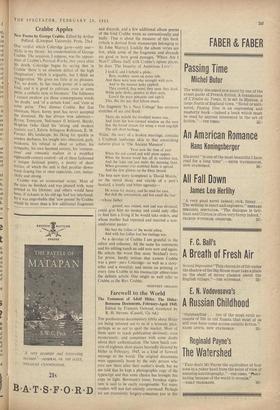Crabbe Apples
ONE verdict which Coleridge gave—only one— sticks in my throat: his condemnation of George Crabbe. The occasion, I suppose, was the appear- ance of Crabbe's Poetical Works, two years after his death. Coleridge began by saying that in Crabbe 'there is an absolute defect of the high imagination'; which is arguable, but I think an exaggeration. 'He gives me little or no pleasure. Vet, no doubt, he has much power of a certain kind, and it is good to cultivate, even at some pains, a catholic taste in literature.' The fishbones cannot swallow are those contemptuous words no doubt,' and 'of a certain kind,' and 'even at sortie pains.' They dismiss Crabbe. But that obstinate, blunt, horny poet has never accepted the dismissal. He has always won admirers— Byron, Tennyson, Nekrassov (I believe), Hardy, Hopkins (who liked his 'strong and modern realistic eye'), Edwin Arlington Robinson, E. M. Forster. His landscape, his liking for sparkle in sombre darkness, his insight into obsession, guilt, weakness, his refusal to cheat or soften, his sympathy, his own haunted anxiety, his 'romanti- cism' and romantic realism in a modified eighteenth-century control—all of these fashioned a unique fictional poetry, a poetry of short stories, of which the unit is that peculiar down- ward sloping line at once capacious, curt, melan- choly and strong.
Crabbe was an economical writer. Most of the tales he finished, and was pleased with, were Printed in his lifetime; and others would have been, if sickness in his old age had not interfered. So it was improbable that 'new poems' by Crabbe would be more than a few additional fragments
and discards, and a few additional album poems of the kind Crabbe wrote so conventionally and badly. That is about the measure of this book (which is derived from manuscripts belonging to Sit John Murray). Luckily the album verses are few, while some of the fragments and discards are good or have good passages. 'Where Am 1 Now?' aflines itself with Crabbe's opium pieces. So does 'The Insanity of Ambitious Love': I look'd, and I beheld a plain, Bare, trodden, worn on every side, And there were men who wrought with pain.
And to the meaner tasks applied.
They comb'd, they wove, they span, they dyed, While pale clerks, pensive at their seats, Earn'd the poor pittances and sigh'd, This, this the pay that labour meets.
The fragment 'In a Neat Cottage' has ominous stretches of sea and flood:
There she beheld the troubled waters rise, And from her bow-formed window on the west Saw the broad stream for many a rood engulph The salt short herbage.
'Poins,' the story of a broken marriage, contains a Crabbish landscape akin to that astonishing autumn piece in 'The Ancient Mansion':
'Twas now the time of year When the red cornet and wild plum appear, When the brown wood has all its verdure lost.
And the faint sun just melts the morning frost, When gossamer Ver stubbled fields is spread,
And the dew glitters on the filmy thread. The best new story (complete) is 'David Morris.' on the moral decay and suicide of a peer's bastard, a lonely and bitter agnostic—
He wrote for money, and he read for case, But dull the amusement, and but small the fees — whose father . . . gamed, was ruined, wed and was divorced, could give him no money and could only offer to find him a living if he would take orders, and whose mother had repented and married a non- conformist pastor :
She bad the follies of the world adieu,
And with her follies lost her feelings too.
As a devotee :of Crabbe I am grateful to the editor and exhumer. All the same his comments and his editing touch an odd note now and again. He selects the worst (but most 'finished') story for praise, hardly notices that austere Crabbe was a poet—pace Coleridge—as well as a story- teller and a moralist; and insists on printing ye every time Crabbe in his manuscript abbreviates the definite article. One might as well refer to Crabbe as the Rev. Crabbe.
GEOFFREY GRIGSON






































 Previous page
Previous page